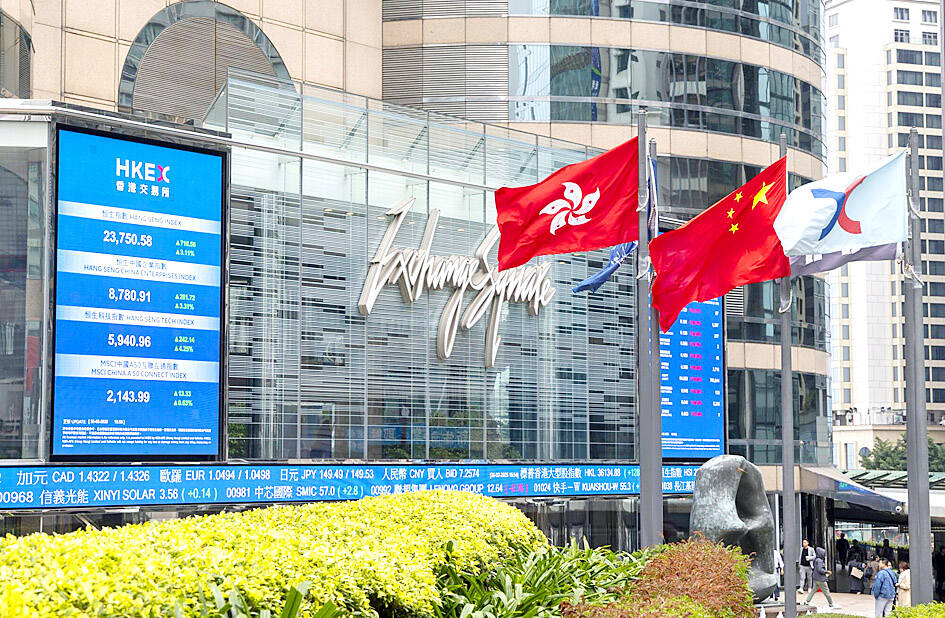Hong Kong’s stock exchange yesterday reported record profits and trading turnover, after a bumper initial public offering (IPO) that may signal a turnaround in the city’s fortunes as a listing hub.
Profit attributable to shareholders rose 10 percent to HK$13.1 billion (US$1.68 billion) last year while daily turnover for the cash equities market peaked at US$80 billion, Hong Kong Exchanges and Clearing (HKEX) said in a statement.
The Chinese finance hub saw a prolonged slump in IPOs since 2020, with mega-companies pausing their listing plans in light of Beijing’s regulatory crackdown.

Photo: Yik Yeung-man, Bloomberg
But the US$4 billion IPO of Chinese appliance maker Midea Group Co (美的集團) in September last year — the largest since 2021 — fueled hopes that Hong Kong could reclaim the crown as the world’s top listing destination.
Chief executive Bonnie Chan (陳翊庭), who took over in May last year and is the first woman to lead the stock exchange, said HKEX had made "significant strategic progress" last year.
"The improved macro backdrop supported renewed vibrancy and robustness of our markets, which was reflected in the largest IPO in Hong Kong since 2021 as well as an all-time record trading turnover," Chan said.
There were 71 IPOs, raising US$11.3 billion last year -- far below pre-pandemic peaks — but listing activity "noticeably stepped up momentum in the second half of the year as a result of China monetary and fiscal measures," Chan added.
Revenue and other income also grew nine percent to US$2.9 billion, a fresh record.
Chan said Hong Kong’s fundraising and secondary markets will be buoyed by "stimulative policies in mainland China and interest rate cuts in other major markets" this year.
Chinese battery giant Contemporary Amperex Technology Co Ltd (寧德時代), which provides more than a third of electric vehicle batteries sold worldwide, applied this month to list in Hong Kong, which analysts say can fetch more than US$5 billion.
Shanghai-based toymaker Bloks Group Ltd (布魯可集團) raised US$215 million in its Hong Kong debut last month, while the upcoming IPO of Chinese tea drink company Mixue Group (蜜雪集團) has seen strong demand, according to Bloomberg.
Hong Kong Financial Secretary Paul Chan (陳茂波) announced a program on Wednesday to fast-track the listing of specialist technology and biotech firms, particularly those already listed in China.
The stock exchange also implemented a long-awaited change in September last year to keep markets open during typhoons, matching the practice of major exchanges worldwide.
The city’s benchmark Hang Seng Index climbed to a three-year high this week, thanks in part to a recent surge in Chinese tech companies.

TECH CLUSTER: The US company’s new office is in the Shalun Smart Green Energy Science City, a new AI industry base and cybersecurity hub in southern Taiwan US chip designer Advanced Micro Devices Inc (AMD) yesterday launched an office in Tainan’s Gueiren District (歸仁), marking a significant milestone in the development of southern Taiwan’s artificial intelligence (AI) industry, the Tainan City Government said in a statement. AMD Taiwan general manager Vincent Chern (陳民皓) presided over the opening ceremony for the company’s new office at the Shalun Smart Green Energy Science City (沙崙智慧綠能科學城), a new AI industry base and cybersecurity hub in southern Taiwan. Facilities in the new office include an information processing center, and a research and development (R&D) center, the Tainan Economic Development Bureau said. The Ministry

ADVERSARIES: The new list includes 11 entities in China and one in Taiwan, which is a local branch of Chinese cloud computing firm Inspur Group The US added dozens of entities to a trade blacklist on Tuesday, the US Department of Commerce said, in part to disrupt Beijing’s artificial intelligence (AI) and advanced computing capabilities. The action affects 80 entities from countries including China, the United Arab Emirates and Iran, with the commerce department citing their “activities contrary to US national security and foreign policy.” Those added to the “entity list” are restricted from obtaining US items and technologies without government authorization. “We will not allow adversaries to exploit American technology to bolster their own militaries and threaten American lives,” US Secretary of Commerce Howard Lutnick said. The entities

Minister of Finance Chuang Tsui-yun (莊翠雲) yesterday told lawmakers that she “would not speculate,” but a “response plan” has been prepared in case Taiwan is targeted by US President Donald Trump’s reciprocal tariffs, which are to be announced on Wednesday next week. The Trump administration, including US Secretary of the Treasury Scott Bessent, has said that much of the proposed reciprocal tariffs would focus on the 15 countries that have the highest trade surpluses with the US. Bessent has referred to those countries as the “dirty 15,” but has not named them. Last year, Taiwan’s US$73.9 billion trade surplus with the US

The Taipei International Cycle Show (Taipei Cycle) yesterday opened at the Taipei Nangang Exhibition Center, with the event’s organizer expecting a steady recovery in the industry this year following a tough last year. This year, 980 companies from 35 countries are participating in the annual bicycle trade show, showcasing technological breakthroughs and market development trends of the bicycle industry at 3,600 booths, the Taiwan External Trade Development Council (TAITRA, 外貿協會) said in a statement. Under the theme “Ride the Revolution,” the exhibition has attracted more than 3,500 international buyers from 80 countries to preregister for the four-day event, which is expected to